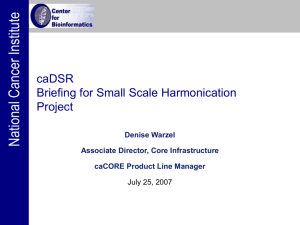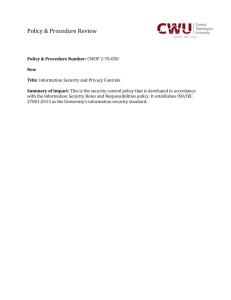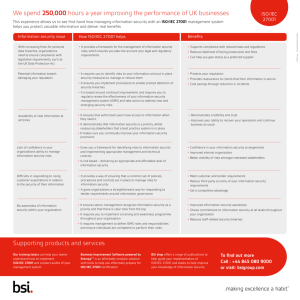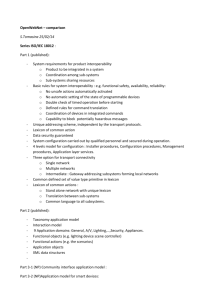caDSR Content Development
advertisement
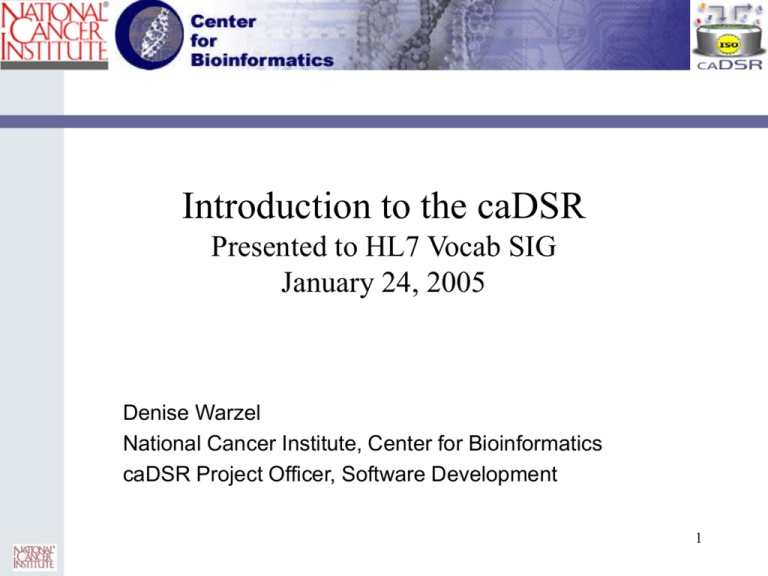
Introduction to the caDSR Presented to HL7 Vocab SIG January 24, 2005 Denise Warzel National Cancer Institute, Center for Bioinformatics caDSR Project Officer, Software Development 1 Presentation Outline • caCORE Overview • ISO/IEC 11179 Overview • caDSR Implementation and tooling D. Warzel 2 caCORE Components • caCORE is the open-source foundation upon which the NCICB builds its research information management systems Bioinformatics Objects Data Standards Enterprise Vocabulary D. Warzel 3 caCORE Infrastructure wiring Public APIs Domain object metadata Common data elements (CDEs) Common data elements Vocabulary for CDE specification D. Warzel Dictionary, thesaurus services 4 Presentation Outline • caCORE Overview • ISO/IEC 11179 Overview • caDSR Implementation and tooling D. Warzel 5 Terms and Definitions for ISO/IEC 11179 Administered Item: A registry item for which administrative information is recorded in an Administration Record Data Element: A unit of data for which the definition, identification, representation, and permissible values are specified by means of a set of attributes. Data Element Concept:An idea that can be represented in the form of a data element, described independently of any particular representation. Data Element Representation: The part of a data element having A value domain, datatype,and other representational specifications. Representation Class:A classification of data elements based upon the type of representational form. Data Element: A unit of data for which the definition, identification, representation, and permissible values are specified by means of a set of attributes. Data Element Concept: An idea that can be represented in the form of a data element, described independently of any particular representation. Value Domain: A set of attributes describing representational characteristics of instance data with or without enumerated permissible values. Conceptual Domain:A set of possible value meanings of a data element expressed without representation. Value Meaning:A member of the set of finite allowed inventory of notions that can be categorized for a conceptual domain. D. Warzel Value Domain: A set of attributes describing representational Characteristics of instance data with or without permissible values. Permissible Value:An expression of a value meaning in a specific value domain 6 What is ISO/IEC 11179? • ISO/IEC 11179 Parts 1-6: Information technology – Specification and Standardization of data elements – A metamodel for ‘data element’ metadata – Standard by which to convey semantic, syntactic and lexical meaning • Human and machine understandable • Unambiguous D. Warzel 7 ISO/IEC 11179 Information technology Standard • ISO/IEC 11179 Part 1: Framework for the specification and standardization of data elements • ISO/IEC 11179 Part 2: Classification for data elements • ISO/IEC 11179 Part 3: Registry metamodel and basic attributes • ISO/IEC 11179 Part 4: Rules and Guidelines for the Formulation of Data Elements • ISO/IEC 11179 Part 5: Naming and Identification Principles for Data Elements • ISO/IEC 11179 Part 6: Registration of data elements • Publically Available from: • http://isotc.iso.ch/livelink/livelink/fetch/2000/2489/Ittf_Home/PubliclyAvailableSt andards.htm??Redirect=1 D. Warzel 8 Basic Metamodel Components Conceptual_Domain Data_Element_Concept Data Element Concept +having 0..* +specifying 1..1 Conceptual Domain data_element_concept_conceptual_domain_relationship 1..1 +represented_by 1..1 +specified_by Perception expression specification Representation +representing +providing_representation_to 0..* 0..* Value_Domain Data_Element Data Element representation 0..* +providing_representation_for D. Warzel Value Domain 1..1 +represented_with 9 Why ISO/IEC 11179? • “What is this datum?” – Provides concrete guidance on the creation and maintenance of discrete data element attributes and metadata (semantics) enabling the formulation of data elements in a consistent, standard manner – • “Metadata Repository/Registry” – Framework for Data element standardization and registration allow the creation of a shared data environment in much less time and with much less effort than it takes for conventional data management methodologies. • Adoption of 11179 Allowed us to “Get on with it” D. Warzel 10 ISO/IEC 11179 Administered Items Administered_Item Classification_Scheme Conceptual_Domain Context (for administered item) Data_Element Data_Element_Concept Object_Class Property Representation_Class Value_Domain Derivation_Rule D. Warzel 11 ISO/IEC Administered Item Administration Record and Common Attributes • • • • • • • • • • Unique Identifier Administrative Status Registration Status Creation Date Administrative Note(s) Effective Date Change Date(s) Change Description(s) Origin Until Date D. Warzel • • • • • • • • Created By Modified By Name(s) Definition(s) Stewardship Information Submitter Information Reference Document(s) Classifications 12 ISO/IEC 11179 NCICB Extensions Administered_Item Classification_Scheme Form Conceptual_Domain Context (for administered item) Concept Class Data_Element The Concept Class Provides Semantic Linkage Data_Element_Concept Object_Class Property Representation_Class Value_Domain Derivation_Rule D. Warzel 13 caDSR Implementation of ISO/IEC 11179 Model Conceptual Domain Agent Object Agent Classification Schemes caDSRTraining Valid Values Data Element Concept Chemopreventive Agent Value Domain Chemopreventive Agent Name Property Chemopreventive Cyclooxygenase Inhibitor Doxercalciferol Eflornithine … Ursodiol Representation Name Data Element Chemopreventive Agent Name D. Warzel Context caCORE 14 NCICB Concept Class Common Attributes • Concept Class • Administered Item attributes + • Concept Unique Identifier • Pointer to an externally defined concept • Concept Definition Source • Names the source terminology/ontology/vocabulary • Concept Relationship • Semantic Order of the concepts • NOTE: ISO describes a ‘Concept Relationship’ as a semantic link among two or more concepts. There is a subtlety in our implementation. In caDSR use the concept relationships as more of a derivation rule, naming the order of the concepts - not semantic relationships in an ontologic or object model sense of ‘relationship’. • Object Class, Property, Representation term, Qualifier terms, Value Domains D. Warzel 15 Why vocabularies/ontology important? • Goal: “Semantically unambiguous, interoperability” • Data Element curators are not necessarily vocabulary experts • NCI had a terminology and vocabulary services group: EVS • Semantic integration is achieved by tying Standard vocabulary identifier codes to the caDSR metadata • The ISO 11179 provides the framework – we were looking for something that could be computed without a human having to read and interpret definitions • By abstracting the curation of concepts in caDSR and instead relying on external vocabularies D. Warzel 16 EVS and caDSR Distinctions • caDSR is a metadata repository – maintains metadata to permit a user to locate the correct data element defining the characteristics of a piece of datum, an instance of a specific concept, in sufficient detail to be collected and stored on a computer • EVS is a terminology server – provides services for synonymy, mapping between vocabularies, hierarchical structures, Subconcepts, Superconcepts, Roles, Semantic type, etc. D. Warzel 17 Presentation Outline • caCORE Overview • ISO/IEC 11179 Overview • caDSR Implementation and tooling D. Warzel 18 caDSR Overview • NCI Data Element Metadata repository and registry • Based on the ISO/IEC 11179 • Designed to integrate caCORE infrastructure • Supports the development and deployment of Data Elements that are used as metadata descriptors, primarily for NCI-sponsored research, with an ever widening girth of end users • Available as an open-source download D. Warzel 19 caDSR Tools • Goals of caDSR Tools development: – Simplify development and creation of ISO/IEC 11179 compliant metadata by Data Element Curators and UML Modelers – Simplify consumption of Data Elements by end users and application developers – Enhance reuse of Data Elements for all – Enable semantic consistency across research domains – Support metadata life-cycle and governance processes D. Warzel 20 caDSR Home Page Curators D. Warzel Developers General 21 Introduction to caDSR Tools – CDE Browser to Search for and Download – Form Builder to Create user specified collections of CDEs – Side-by-Side Compare – CDE Curation Tool to Create Data Elements – Admin Tool to Curate and Administer caDSR - “Power Users” – Sentinel Tool (3.0) • Generates end user ‘Alerts’ triggered by metadata changes – Batch Load to import Administered Items • Excel Loader (MS Excel) • UML Loader (XMI) • Case Report Form Loader (MS Excel) Access, Develop, Manage, Consume D. Warzel 22 CDE Browser “CONTEXT Browsing” • View, Search, Download – Shopping cart feature • FormBuilder to Build / Download Forms and Data Elements • “Context Browsing” Tree – By Classification Schemes – By Forms • CDE Basic Search Criteria Basic Search D. Warzel – Google-like search – Sortable search results by clicking on column headings 23 CDE Browser • Advanced Search Criteria – Leverages ISO attributes • Find all with “18254-3” permissible value • Find all with “Gene*” • Find all with “Released” workflow status • Find all with “Standard” Registration status • Etc. Advanced Search D. Warzel 24 Form Builder • Create and Manage Forms – Organize CDEs into modules within a Form – Attach pdf or word format – Classify Forms into groupings for specific end user communities – “Publish” “Un-Publish” for Browser Catalog visibility • “Printer Friendly” version • Download CDEs D. Warzel 25 CDE Side-by-Side Compare • CDE Side-by-Side Compare – Build shopping cart, compare CDE metadata side by side – Download to excel spreadsheet D. Warzel 26 Curation Tool • To Create, Edit or Version: • Data Element Concepts • Value Domains • Data Elements • ISO 11179 Wizard – Construct ISO compliant Data Elements by building up the pieces • Builds Names and Definitions from underlying components. • “Get Associated” – Leverage ISO to retrieve related CDEs • “Block Edit” D. Warzel • “shopping cart” • Assign classification schemes • Versioning 27 Administration Tool • System Administration • User Accounts and Security • Lists of Values (LOVs) used in content creation • Create “Framework”: • Conceptual Domains • Classification Schemes (basis for organizing CDEs in Browser) • Protocols D. Warzel 28 Sentinel Tool • Create “Alerts” – User defined triggers based on data element metadata attributes – “notify me of any change to the Value Domain for any CDE on the Adverse Event Form • Generates and emails a report of changes matching “Alert” criteria D. Warzel 29 Batch Loading OC caDSR DEFAULT VALUES: Workflow status = "Released" Alw ays. Version = 1.0 Alw ays. Create Date =Date loaded by Loader. Created by = EVS. Long Name = EVS Preferred nam e EVS Preferred Nam e Definition Definition Source Database Context Preferred Nam E effective Begin Date Change Note Alternate Nam e Type VARCHAR2 (20) Mapped to Long Name and Preferred Name Not Null VARCHAR2 (2000) PreferredDefinition VARCHAR2 (2000) Definition Source VARCHAR2 (255) Database VARCHAR2 (20) Requestors Context VARCHAR2 (30) YY.MM.B VARCHAR2 (2000) Text VARCHAR2 (20) AlternateName.Type Not Null Celsius Scale The temperature scale defined by the values 0 degree Celsius for the freezing point of water and 100 degrees Celsius for the boiling point of water. The Celsius degree (C) is the same size as a Kelvin and equal to (F - 32)/1.8. To convert Celsius to Fah Null NCI Not Null NCI Thesaurus Not Null caBIG Null 11/18/2004 Null Requested by Dianne Reeves Not Null NCI_Concept_Code HEENT NCI HEENT is the Head, Ears, Eyes, Nose and Throat, and is referred to as a body system on a physical or medical examination. The term is typically used as 'HEENT' in a physician or caregiver notes. NCI Thesaurus caBIG 11/18/2004 Requested by Dianne Reeves NCI_Concept_Code The Gracely Pain NCI Unpleasantness Scale is a visual analog scale of 0 to 20 used by a subject to define their pain unpleasantness experience. Together with the intensity scale these tools serve to differentiate the patient's sensory perception of pain inte NCI Thesaurus Gracely Pain Unpleasantness Scale D. Warzel caBIG 11/18/2004 Requested by Dianne Reeves NCI_Concept_Code • Excel Loaders – Formatted MS Worksheet • Administered Item • Form • UML Loader – XMI representation of a UML Class Diagram • Class Object Class • Attribute Property • Data Element Concept, Value Domain and Data Element derived from the above 30 Current User Base • • • • • • • • • • Cancer Biomedical Informatics Grid (caBIG) – 820/466/180/ 61% * Center for Cancer Research (CCR) – 821/573/506/ 12% Clinical Data Interchange Standard Consortium (CDISC) - 3/0 Center for Cancer Imaging (CIP) - 238/151/148/ 2% Cancer Therapy Evaluation Program (CTEP) – 8029/2432/2428/ .1% Division of Cancer Prevention (DCP) – 427/321/286/ 11% National Heart Lung and Blood Institute (NHLBI) – 0/0 Early Detection Research Network (EDRN) – 121/1/1/ 100% Divisions of Population Sciences and Cancer Control (PS & CC) 85/9 Specialized Programs of Research Excellence (SPOREs) – 719/197/120/ 39% • Cancer Ontologic Research Environment (caCORE) – 1028/810/810 0% * Total CDEs in this Context / ”Released” workflow status / ”Released” and developed by this context / “Reused” from other contexts D. Warzel 31 Exploring • National Institute of Neurological and Disorders and Syndromes (NINDS) • National Icelandic Center for Oncology • Cancergrid – UK D. Warzel 32 Operating Environments • Database Repository – Oracle 9i • Administration Tool – Oracle PL/SQL, Oracle 9i Application Server • CDE Browser – Java, Oracle 9i Application Server • CDE Curation Tool – Jakarta Tomcat D. Warzel 33 Support • NCICB Help Desk – ncicb@pop.nci.nih.gov and telephone support • Bi-weekly Software meetings – Hosted by Denise Warzel – Telconference and web-cast • Bi-weekly Content Development Meetings – Hostd by George Komasoulis – Telconference and web-cast • Open end user requirements meetings, design reviews and prototyping/feedback sessions • Training – Web-cast and telconference D. Warzel 34 Contact Information • caDSR Home Page – http://ncicb.nci.nih.gov/core/caDSR • caDSR Users ListServ – http://list.nih.gov to subscribe to caDSR_Users@list.nih.gov • caDSR Training Home Page – http://ncicb.nci.nih.gov/NCICB/core/caDSR/Training • caDSR Training ListServe – http://list.nih.gov to subscribe to caDSR_TrainingL@list.nih.gov D. Warzel 35 Documentation/Recommended Reading Materials • caDSR Homepage: – http://ncicb.nci.nih.gov/core/caDSR • caCORE User Application Manual: – ftp://ftp1.nci.nih.gov/pub/cacore/NCICBapplications/NCICBAppManual.pdf • caCORE Technical Guide: – ftp://ftp1.nci.nih.gov/pub/cacore/caCORE2.0_Tech_Guide.pdf – caDSR APIs • caDSR API Guide: – ftp://ftp1.nci.nih.gov/pub/cacore/caDSR/caCORE2.0_caDSR_API.pdf • caDSR Business Rules – http://ncicb.nci.nih.gov/NCICB/core/caDSR/BusinessRules • caDSR Content Meetings – http://ncicb.nci.nih.gov/NCICB/core/caDSR/Content • caDSR_Users List serv subscribe: – http://list.nih.gov – Send Request for caDSR Account to: ncicb@pop.nci.nih.gov D. Warzel 36 caDSR Tools Team • NCICB – Peter Covitz – Denise Warzel • ScenPro – – – – – – Bill McCurry Tom Phillips Robert Harding Jennifer Brush Larry Hebel Smita Hastak D. Warzel • Oracle – – – – – – – Edmond Mulaire Ram Chilukuri Prerna Aggarwal Dan Ladino Christophe Ludet Shaji Kakkodi Jane Jiang • SAIC – Kathleen Gundry – Tommie Curtis – Brenda Maeske 37
